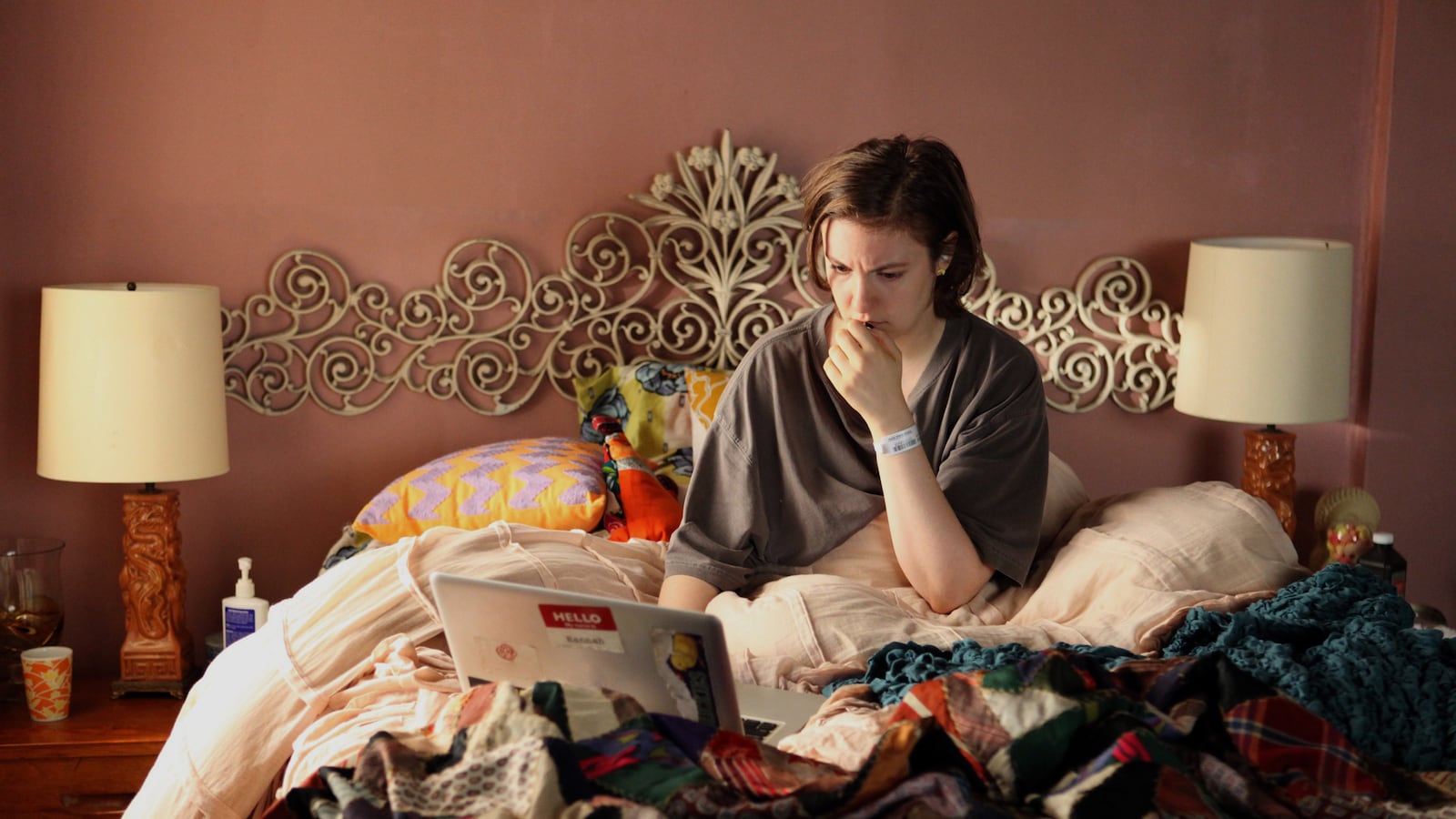It’s 9 o’clock on a Wednesday and our daughter is in bed. The old rabbit-lady has whispered “hush” for the last time (the nameless, knitting, mysteriously-disappearing bunny-lady who is of course the creepiest part of Goodnight Moon). Her magical incantations have wreaked their usual results. All is quiet, except for the HVAC units rumbling away at their business, and darkness has fallen all over the apartment. All three rooms and 750 square feet of it.
Then, in the darkness, some fumbling. Some practiced groping around. A grunt of effort, then a sigh as a body sinks into the couch.
A beep. A whirring. The sound of headphone cords snicking across the floor.
Two screens, now alive with blue light, transform the apartment’s darkness from black to moody indigo, and sudden shadows stretch into all the corners, but if anything, the heatless glow makes the room seem more comfortable. It’s the new firelight.
My husband, on the couch, whispers across the room to me, settled in my usual chair by the window. “What are you doing?”
I respond with an exasperated, unflattering frown, lit from below by the glare of my laptop, and whisper back, “What do you think I’m doing?”
“OK. I’m going to play my game.”
On one screen, my husband begins flicking his self-selected tribe of made-up warrior people through their paces in a role-playing game on his PlayStation. On another, smaller screen, balanced in my lap, I am writing a novel. I do this every night. Correction: We do this, every night.
Like a lot of New York couples with children, we’ve made concessions to our small home that couples outside the city, in their amazing dream houses built of schadenfreude, couldn’t dream of—and to be clear, these are separate concessions from the ones forced by having kids. As so many city couples know, small homes make their own rules, and those rules come to define your relationships—with each other, with your children, with your stuff, and with your interests, if you have any, outside of finding new places to put things.
In our small home, for example, one of the rules comes from having our kid’s bed right on the other side of the wall where our TV is: When we watch stuff at night, it’s in the dark, with headphones. (We are the mole people of cultural consumption.) Another rule is, because there’s no room for a desk, I get to write wherever the hell I want—at the table or in bed or on the couch or even, if I were this kind of person, in the bathroom—and my husband accommodates me because he wants me to write a mega-bestseller so we can move into an apartment where I don’t have to write in the bathroom.
Another rule our small space both creates and enforces: In the evenings, after we put our girl to bed, my husband and I are always together. And not just together, but actually sort of on top of each other, but in the least sexy or sex-producing way imaginable. We can never be farther than 20 feet from each other, even if, at the end of a long and packed and exasperating day, we both really would like to be. Even if, in order to squeeze in some writing or thinking or independent time, we both really need to be. Even if, after wrestling our wonderful-but-sometimes-developmentally-appropriately-obnoxious preschooler into a bath and then bed, we just want five goddamn minutes to ourselves to drink a glass of wine and listen to some music and stare at a wall.
So as the blue night stretches on toward grownup bedtime, we share a space, and a general sense of goodwill and companionship, but not much else. I tap and glower at my keyboard in the near darkness, while my husband mutters curses and punches buttons. Both of us mouth-breathe a little and then realize we’re doing it and then try to stop. One of us (usually me) gets up at some point and pours us both a glass of wine. He acknowledges his with a friendly nod, but pausing to drink it would mean losing a fight with a zombie.
We’re the same type of person, he and I. Urban introverts. Both of us draw our strength (which I will define as our ability to face the demands of the world with anything approaching common decency) from time spent alone, which I’ve read is the classic definition of an introvert. It’s an everyday paradox of urban life that there are millions of us introverted city dwellers, living every day on top of each other.
If two introverts are incessantly knocked together like a couple of deranged psychic maracas by the size of their apartment, do they make a sound? In our case, not so much. We are happy enough as long as we can be together alone.
But married people do need to talk to each other, after all. We have to communicate and work as a team; we have to go on date nights and fold laundry and argue over what to order from Fresh Direct. This past winter, my husband and I had a long, long string of those quiet blue nights, both of us staring at ghosts of imaginary people flickering across separate screens. How to explain that without sounding like we’re on the brink of divorce, or at the very least a de facto decoupling? How can I explain that our nights alone together actually strengthened our marriage?
Because the fact is, I drove my husband to a nightly Playstation habit in the name of “art”—me, myself, I did it. I did it knowingly and with his full consent, of course. But I also acknowledge that if someone, some marriage counselor or other well-meaning stranger, had looked in the window of our apartment one of those nights while I was writing and seen our tranquil, blue-glowing, double-screen domestic idyll, they would probably have been deeply, deeply unimpressed at what they saw. Two people setting the world on fire we were not. And what did I think I was doing, anyway? Just how good does a novel-in-progress have to be to warrant basically ignoring someone you love while you’re in the process of writing it? Like, Leo Tolstoy good, or just like early Sweet Valley High good?
“Are you tired?”
“Yeah. My eyes hurt.”
"Ready to go to bed?”
"Um. I need another hour. I’m in the middle of a… thing.”
“OK. I’m going to bed.”
(Sometimes, but less often than I would like to admit, I would perform the courtesy of putting on my pajamas and brushing my teeth while my partner in urban introversion was also getting ready for bed—so as not to wake him up with my rustling and water-running in the true-dark hours when I finally gave up wrestling with the writing. But not always. Nope. Not even close to always. More often, I would blink at my laptop until I couldn’t see, and then bull around in the dark trying to undress and wash up as quietly as possible, which was never very quietly, after all.)
We did the blue nights for close to a year. It was the only way I could get the damn book finished, after all. We were both working long days that started at 6:30 a.m. Mornings were too chaotic. Weekends were too full. Writing every day was definitely doing something to me—it was changing how quickly and how alertly I could write, it was making me better at what I was doing, just like all the writing experts say a daily writing habit will. But the only hours available for that daily writing habit were hours that relationship experts say should be spent doing couple things. Fighting couple fights. Washing couple dishes. Having couple… couplings.
Did he ever feel lonely? Yes. Yes. So did I. But we both signed on for it. Not just me, but him too, my partner. What was in it for him?
“Good night.”
Silence.
“I said good night.”
“What? Oh sorry. Good night, honey. Thank you. Thank you.”
If you’re a full-time working parent who’s trying to write, or build a business, or paint murals, or do whatever it is that you know you’ve got to do, you’re going to have to ask for some of your own concessions. Which, if you are lucky, your partner will be cool about. If you are lucky, you will have a partner who won’t mind being gently, oh so gently, pushed to the side in favor of something you can’t even really explain, something not as important as your family but also, at the same time, the only thing that’s more important than them. If you’re lucky, your partner will find expedient ways to be pushed gently to the side. If you’re lucky, you’ll be married to a city introvert. A city introvert who believes in you, who believes in being a good partner even when sometimes that partnership feels less than equal, but who wants to believe, like you want to believe, that it will all come out even in the end.
The kind of partner every woman with a goal for herself needs. Deserves. Must not stop until she finds.
And if you yourself are a woman with a goal who has been so lucky as to find that kind of a partner, then I have one final wish for you, my comrade, my friend. I hope you don’t have room of your own. I hope you don’t even have a desk.
I hope you will live in a home that’s 750 square feet. You’ll make it, don’t worry. People have done more, lots more, with less, lots less. And you’ll never be alone. Not even when you are together.
Siobhan Adcock received her MFA in fiction from Cornell University, and her short fiction has appeared in several literary magazines. She has worked as a writer and editor for Epicurious, Gourmet.com, iVillage.com, and The Knowm, among other digital publishers. She lives with her family in Brooklyn, New York. The paperback edition of her debut novel, The Barter, appears on August 4.





